
04/10/2023
Award for Circular Projects Recognized at Fenecit Science Fair
By Arlene Carvalho, from Movimento Circular
The first international edition of the Award for a World Without Waste is scheduled for November 25th and will feature scientific projects related to Circular Economy from various countries, including Brazil, Argentina, Mexico, Colombia, and Chile.
This year, the award has already highlighted a range of outstanding projects at various science and technology fairs throughout Latin America. One such standout was the Praec project, originating in Pedra Branca, Ceará, which secured first place in the Award for a World Without Waste during the Northeast Science and Technology Fair (Fenecit), held in Recife, Pernambuco, in September.
 The Praec Project took first place at the fair. Image: Ismaela Silva/Movimiento Circular
The Praec Project took first place at the fair. Image: Ismaela Silva/Movimiento Circular
The team of students, Caio Santos and Luiz Henrique Lima, earned recognition in the Circular Movement category. Their project aims to create an autonomous system for treating contaminated wastewater, offering a technological and environmentally friendly solution for the arid northeastern regions. The project emerged from their own experiences as students at the Antonio Rodrigues de Oliveira State School in Pedra Branca, located over 260 km from Fortaleza, the capital of Ceará.
"We thought of a way to reuse this already scarce water without losing any part of the waste, using computer programming to automate the process," explained Luiz Lima. "Given this scarcity, it is essential for the scientific community to seek ways to treat and reuse domestic wastewater to benefit families, especially those with low income who suffer the most from water shortages."
 The system is easy to make and, according to the students, it's also cost-effective. Photo: Ismaela Silva/Movimiento Circular
The system is easy to make and, according to the students, it's also cost-effective. Photo: Ismaela Silva/Movimiento Circular
Their project required assistance from the IFCE (Federal Institute of Education, Science, and Technology of Ceará) Campus Quixadá, a neighboring city to Pedra Branca, to measure the quality of the water entering and exiting their system accurately.
The students, in their third year of high school, emphasized the system's adaptability to different water quantities. "We can adjust the size of the components and containers according to the quantities. Our system doesn't use any additives; it relies on the natural processes of the water cycle," said Luiz Lima. "It's a simple, cost-effective system where you can assemble the valves with recycled parts, and if you need to buy components, it's not expensive."
A website is currently in development and will soon be available to the community. Additionally, the duo organizes workshops in their region to empower other students to replicate the model or create their innovations for the community's benefit.
 Students from Rio Grande do Sul created a highly resistant bioplastic. Photo: Ismaela Silva/Movimento Circular
Students from Rio Grande do Sul created a highly resistant bioplastic. Photo: Ismaela Silva/Movimento Circular
Other Highlights
In addition to the Praec Project, other projects have caught the attention of the Circular Movement. One such project, "Production and Analysis of Biodegradable Polymeric Films from Rice Husks and Corn Straw," secured second place in the Award for a World Without Waste.
Developed by students from Rio Grande do Sul, the project aims to combat pollution caused by non-biodegradable plastics by producing bioplastics from agricultural waste, such as rice husks and corn straw—abundant and often without a sustainable disposal method in the RS region. These bioplastics are soluble and biodegradable, reducing environmental impact and offering more sustainable alternatives for the industry to mitigate plastic pollution problems.
 Several experiments have shown that the bioplastic made from rice and corn straw with gelatin is the most successful among those tested. Photo: Arlene Carvalho/Movimento Circular
Several experiments have shown that the bioplastic made from rice and corn straw with gelatin is the most successful among those tested. Photo: Arlene Carvalho/Movimento Circular
The third place in the Award for a World Without Waste went once again to Ceará, this time in the city of Beberibe, approximately 84 km from Fortaleza. The Bio-Heilverband project explores the use of herbal medicines to treat burns. They developed a dressing made from a mixture of olive oil, sweet potato starch, chamomile, and aloe vera, with healing properties. The dressing accelerates the healing process and decomposes quickly in the soil, reducing waste.
 The project's idea is to create an effective burn dressing that generates less waste. Photo: Ismaela Silva/Movimento Circular
The project's idea is to create an effective burn dressing that generates less waste. Photo: Ismaela Silva/Movimento Circular
Honorable Mention
Beberibe, Ceará, also earned an honorable mention this year with the Bio Plants No Termites project. Students noticed an abundant amount of crab shells along the beach and decided to investigate their potential use as fertilizer and pesticide for plants in the region. After collecting and preparing the shells, they applied them to both small and large plants.
The results showed healthy plant growth and effective termite elimination after the application. This work suggests the feasibility of using crab shells as a biodegradable fertilizer and pesticide, although further research is needed due to the limited literature on the subject.
 The research on crabs by the girls from Beberibe, Ceará, is so innovative that even finding literature was challenging. Image: Ismaela Silva/Movimento Circular
The research on crabs by the girls from Beberibe, Ceará, is so innovative that even finding literature was challenging. Image: Ismaela Silva/Movimento Circular
Fenecit and the Circular Movement
A world with more opportunities is created through the connections we make. This was the idea behind bringing together the Circular Movement and its expertise to promote Circular Economy and the Northeast Science and Technology Fair (Fenecit), which celebrated its 19th edition in September.
"Fenecit emerged from my admiration and desire to take my students to the Febrace. Since it wasn't possible, I brought a piece of it here. It's inspiring to see how dedicated they are and how Fenecit impacts their lives," explains Rosenilda Vilar, a teacher and the fair's founder.
The partnership brings to the forefront the science that has become a part of students' daily lives and has the potential to become concrete actions that can transform our way of life.
For the Circular Movement, partnering with fairs like Fenecit signifies the beginning of a larger movement towards a World Without Waste.
"For us at the Circular Movement, the partnership with Fenecit marks the start of an expansion of a significant movement towards a World Without Waste. Recognizing and acknowledging projects with Circular Economy initiatives in Northeast Brazil further strengthens the work that students in Brazil and other Latin American countries have been doing to bring about real changes in waste culture towards a more circular economy," says Maria Carolina Stenico, project manager at the Circular Movement.
What is Circular Economy?
Circular Economy proposes a new approach to how we produce, consume, and dispose of items, aiming to optimize the planet's resources and generate less waste. It is an alternative model to the Linear Economy, which involves extracting, producing, using, and disposing of items, a model that has proven increasingly unsustainable throughout history.
In the Circular Economy, the goal is to keep materials in circulation for as long as possible through reuse until nothing becomes waste. To make this model a reality, each of us has a role to play. It's a true collaborative circle that sustains itself and helps regenerate the planet and our relationships.
Learn About Circular Economy
If you're interested in learning more about this topic, visit the Circular Academy, the first free Latin American course on circular economy for the general public. Through partnership and collaboration, we can all make a difference in building a more circular planet.

